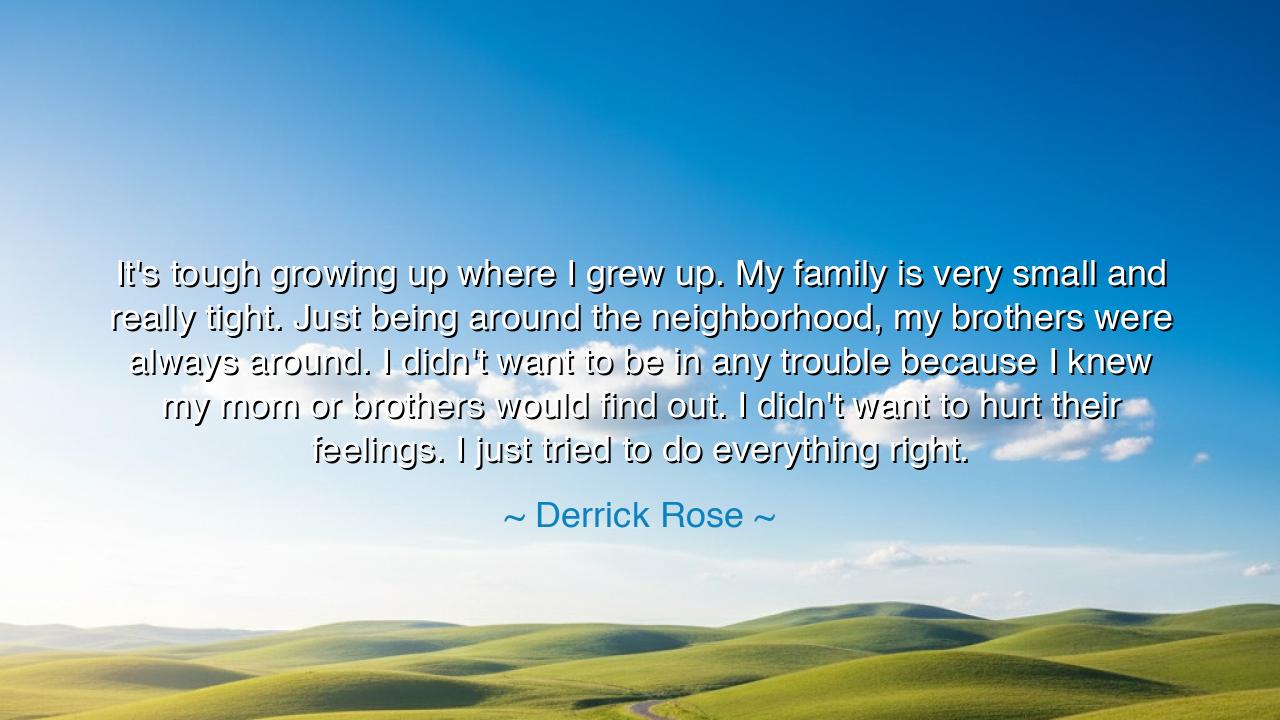
It's tough growing up where I grew up. My family is very small
It's tough growing up where I grew up. My family is very small and really tight. Just being around the neighborhood, my brothers were always around. I didn't want to be in any trouble because I knew my mom or brothers would find out. I didn't want to hurt their feelings. I just tried to do everything right.






The words of Derrick Rose, “It's tough growing up where I grew up. My family is very small and really tight. Just being around the neighborhood, my brothers were always around. I didn't want to be in any trouble because I knew my mom or brothers would find out. I didn't want to hurt their feelings. I just tried to do everything right,” are not the boast of a champion, but the humble confession of a man shaped by hardship and love. Beneath their simplicity lies a profound truth about discipline, loyalty, and the invisible strength of family — the unseen foundation upon which every act of greatness stands. In these words, Rose speaks not merely of basketball, but of the eternal struggle between temptation and purpose, between the streets that call and the love that anchors.
He was born in the heart of Englewood, Chicago, a place known not for comfort, but for conflict — a neighborhood where talent could be devoured by the streets before it ever reached the light. Yet from this soil of danger and difficulty, Derrick Rose emerged, not because he was untouched by struggle, but because he was surrounded by family who held him fast to the path of integrity. He knew that one misstep could bring shame not just upon himself, but upon those he loved. His conscience was guarded by affection — by a mother’s watchful eyes and brothers who stood beside him like sentinels of character. In this, he embodies an ancient truth: that love, when strong enough, becomes law.
Such wisdom would not be foreign to the philosophers of old. The Stoics taught that virtue is born from self-control, and that the man who governs himself is freer than the one who follows his passions. Rose lived this not from books, but from survival. His neighborhood tested him, whispering paths of violence and temptation — yet he walked another road, guided by the fear of disappointing those who believed in him. This is not the fear of punishment, but the higher fear of dishonor — a sacred respect that the ancients would have called pietas, the reverence for one’s roots, family, and duty. It is the foundation of every noble soul.
There is a story told of Alexander the Great in his youth, when his tutor, Aristotle, taught him that greatness is not in conquest but in mastery of the self. When Alexander once lost his temper and killed a friend, he wept bitterly afterward, crying that he could conquer nations but not his own heart. Derrick Rose, in his own way, learned the same lesson young — that true strength is not shown in defiance but in restraint. In refusing the easy path of rebellion, he achieved a greater victory: the triumph of character over circumstance.
The tightness of his family is the key to his endurance. Where others fell to loneliness, he found protection in belonging. His mother’s love became his compass; his brothers, his shield. Every decision, every effort to “do everything right,” was an act of love returned. His story reminds us that greatness rarely grows from isolation — it is the fruit of connection. Just as the mighty oak draws its strength from hidden roots, so too does the soul draw courage from those who stand unseen behind it.
And yet, within his words is also sorrow — the quiet knowledge of how hard it is to do right when the world around you rewards the wrong. Rose speaks not as a preacher, but as a survivor. His struggle was not only against temptation, but against despair, against the belief that goodness cannot thrive in harsh soil. That he succeeded is proof that light does not need perfect conditions to shine. It only needs purpose — and love strong enough to protect it.
The lesson of Derrick Rose’s words is timeless: character is born in the struggle between love and the world. The one who remembers whom he fights for, whom he might wound by his choices, will find strength even when the path is dark. If you wish to live rightly, remember those whose hearts would break if you fell. Let their faith in you be the boundary that keeps you from ruin. For in honoring them, you will not only rise — you will rise rightly, and leave behind a legacy that is both victorious and pure.






AAdministratorAdministrator
Welcome, honored guests. Please leave a comment, we will respond soon